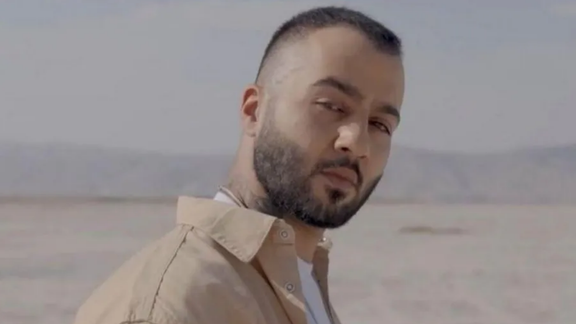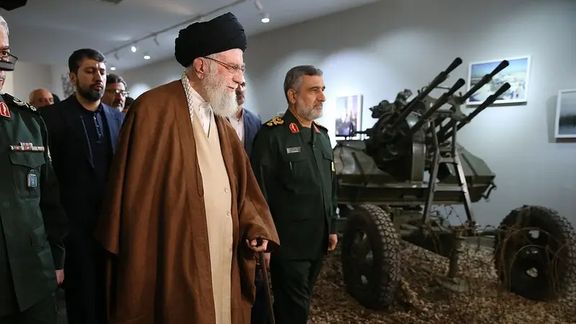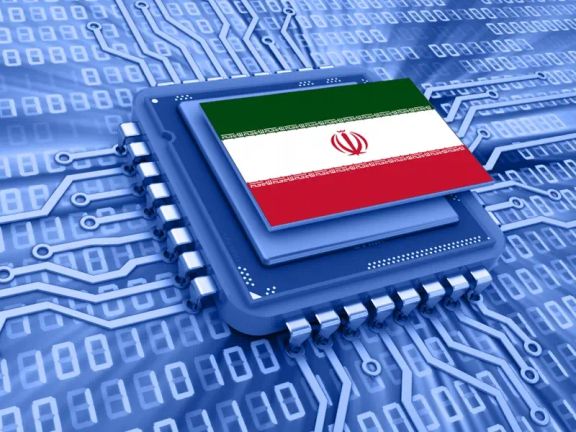Iranian authorities bring new charges against jailed rapper Toomaj Salehi

Two new charges have been brought against jailed Iranian rapper Toomaj Salehi, whose death sentence was overturned by Iran's Supreme Court in June.

Two new charges have been brought against jailed Iranian rapper Toomaj Salehi, whose death sentence was overturned by Iran's Supreme Court in June.
Without revealing details, Salehi's social media page administrator disclosed new charges against him on X on Thursday, adding, "Intelligence agents with the cooperation of judicial officers are opening two new cases with false charges against Toomaj Salehi."
German MP YeOne Rhie, Salehi’s political sponsor, also reported the new charges, saying that the Iranian government does not want to release Toomaj so the authorities have levied new charges against him.
“The Iranian regime is afraid. Afraid of releasing Toomaj…that is the only reason for the new, completely abstruse charges, which once again lack any basis in the rule of law,” Salehi’s political sponsor German MP YeOne Rhie wrote on X reacting to the news.
In June this year, a death sentence against the rapper was overturned by Iran’s Supreme Court. His lawyer Amir Raisian announced that the case had been referred to a parallel branch for consideration.

Amir Ali Hajizadeh, commander of the Islamic Revolutionary Guard Corps (IRGC) Aerospace Force, touted Supreme Leader Ali Khamenei as the ultimate winner in Iran’s recent presidential election.
The assertion, made in an article for the IRGC-affiliated Javan newspaper Thursday, underscores the entrenchment of Khamenei's influence over Iran’s political machinery. Hajizadeh’s words were unequivocal: "Today, the Islamic system, the Iranian nation, and above all, Khamenei are the victors, and the president's vote should not be questioned."
This statement comes in the wake of the election of Masoud Pezeshkian, following the sudden death of President Ebrahim Raisi. The transition of power, which appeared smooth and controlled, reinforces the perception of political stability under Khamenei's system, as well as his tight control over the electoral process through the Guardian Council.
Its un-elected members play a pivotal role in vetting and approving presidential candidates, ensuring that Pezeshkian’s presidency would align with Khamenei’s broader strategic objectives.
Hajizadeh also urged supporters of Saeed Jalili, the defeated candidate in the election, to "refrain from any comments about the election and any statements that could be interpreted as undermining Masoud Pezeshkian's vote."
He stated that Masoud Pezeshkian is the president of "the entire nation and every single person in Iran and is supported by revolutionary forces."
He added that support for a particular candidate and competition are relevant only before the election.
Critics argue that the recent elections simply reflect a consolidation of power within pro-Khamenei factions, effectively continuing his vision across critical domains such as foreign and military policy, economic strategy, and internal governance.
Lawmaker Mehrdad Goodarzi suggested that the voter turnout was a testament to Khamenei's leadership, despite it being nearly 40% in the first round, the lowest in presidential elections in the history of the Islamic Republic.
The low turnout barely reached 50% in the runoff according to official figures that cannot be independently verified. "The people's participation in the elections was the result of Khamenei's measures and the people's trust in the country, the homeland, and the governmental structures," Goodarzi said.
The narrative positioning Khamenei as the principal victor not only bolsters his legitimacy among his followers but also portrays the electoral process as a direct manifestation of his authoritarian command. It signals that any political transition or policy continuity is merely an extension of his influence.
The US openly said the elections are "not free or fair" in spite of allowing remote polling booths across America.
Amid the tightly controlled campaign, Khamenei's office issued a warning against the 'misquoting’ of the Supreme Leader and his officials by presidential candidates.
The office criticized what it called "incomplete or incorrect references" made by presidential candidates and their associates, insisting that all quotes must be verified through official documents.
Patrick Clawson from the Washington Institute said Khamenei has historically kept senior IRGC figures outside the presidency in order to retain a firm control over his number two. The IRGC, designated a terror group by countries such as the US, remains deeply entrenched in the country's political and economic machinery. It is closely under Khamenei's watch but its leaders are kept out of the presidential field.
"Most famously, he [Khamenei] refuses to allow talk about who will succeed him and has not named a deputy," Clawson said. "In addition, he has created a multitude of competing institutions with overlapping responsibilities and has moved previously powerful figures into shadowy positions at those institutions or made them into one of many advisors."
It means that over the years, Iran's presidents have ultimately lacked true power. "Khatami complained openly that he had no authority over some of his most important cabinet members, including the minister of intelligence, who had been chosen by Khamenei," added Clawson.
In addition, when Raisi took office in 2021, though it was believed he would wield more power and widely felt to be being groomed as Khamenei's successor, "that did not prove decisive ... and he was not particularly consequential in decision making."

As president-elect Masoud Pezeshkian prepares to take office, Iran has once again experienced severe internet disruptions.
Detailed reports from IODA, a platform monitoring global internet access quality, indicate that significant network interruptions began impacting users on Wednesday afternoon.
A tweet from IODA highlighted “two significant network disruptions involving Host Iran and TCI [Telecommunication Company of Iran].”
It comes as the Raisi administration serves its last days in office, sparking suspicion that it is a final push to impose draconian internet crackdowns which characterized the Raisi years.
It sparked fury online. “The minister of internet_shutdown is doing everything he can to finish the job in his final days,” wrote one user.
“Last night, electricity, internet, and even the mobile network were cut off, and they were still down until I went to sleep. The situation is such that it feels like an invisible terrorist group has attacked all the infrastructure. This invisible group is the incompetent management,” wrote another.
Mohammad Jafarpoor, the Deputy Minister of Communications and Information Technology and CEO of the Infrastructure Communications Company acknowledged the issue a few hours after the disruptions began.
He announced that "about 40% of the incoming international internet capacity in neighboring countries had been cut" and stated that "less than half of this drop" had affected the country's communication network.
However, on Wednesday night, the Infrastructure Communications Company in a separate statement said, “there is currently no traffic drop in the network due to international link outages, and the communication status is normal.”
Iran has faced repeated internet disruptions and increased filtering pressures in recent weeks following the sudden death of late President Ebrahim Raisi in a helicopter crash.
During the presidential campaign, internet restrictions stood alongside hijab laws for the contenders as the public demands change. Some of the six candidates criticized the blocking of hundreds of websites and popular social media platforms. However, most proposed developing a national intranet under full state control.
Incoming president, Pezeshkian, the only reformist-backed candidate, even defended the government's "intervention" in internet access, justifying shutdowns during national crises such as the recent protests which led to mass blackouts.
Amid the campaign, he admitted, "When intervention is necessary in a specific crisis, I will intervene".
Standing behind the draconian practice and traditional government line, Pezeshkian claimed that all countries intervene in internet access, a frequently repeated but inaccurate defense by Iranian officials.
Iran is currently ranked 156th out of 181 countries for fixed broadband speeds according to the Speedtest Global Index. The government has escalated its censorship efforts, frequently blocking access to widely used platforms like WhatsApp and Instagram, and deliberately causing service disruptions.
The new president even argued during the campaign that the use of VPNs facilitates access to "obscene" content, not acknowledging that by cutting internet access, millions of Iranians are unable to conduct business amid the country's economic crisis. Millions of small businesses in Iran depend on platforms such as Instagram for e-commerce which internet crackdowns have critically impacted.
A report published by the Podro platform shows that intensified internet disruptions in the two weeks leading up to the snap presidential election resulted in a 40% decrease in traffic for active Instagram stores and a 25% drop in their orders.
However, the government again denied that the internet is in crisis on the back of the Tehran E-Commerce Association's third periodic report which revealed the poor state of the country's digital economy. It emphasized that Iran ranks among underdeveloped countries like Ethiopia and Angola in the international standards of internet quality.
It is a quick fire way for the government to silence dissent. Following the mysterious crash of late President Ebrahim Raisi's helicopter, the government also increased internet access restrictions as celebratory reactions went viral.
This week, the Research Center of the Islamic Consultative Assembly published a report criticizing the country's low internet speed and cited the involvement of various entities in filtering as factors contributing to the complexity and disorder in managing cyberspace in Iran.

The Marshall Islands-flagged tanker Advantage Sweet held by Iran since April 2023 was tracked sailing toward international waters on Thursday according to data analyzed by the Associated Press.
In a report on Thursday, the AP said that the vessel was headed for Khor Fakkan in the United Arab Emirates, a common initial stop for ships released from Iranian detention.
The Advantage Sweet was seized by the Iranian navy last year as it traveled toward the Strait of Hormuz, while carrying $50 million worth of oil from Kuwait for Chevron Corp.
Chevron has maintained that the Advantage Sweet was "seized under false pretenses" and has since written off the cargo as a loss.
Iran has yet to acknowledge the vessel's departure.

Mai Sato, a Japanese social scientist, who is to become the next UN Special Rapporteur on Human Rights in Iran at the end of July, is a top-notch expert on criminal law with a high reputation among rights defenders.
Ms. Sato was one of eleven candidates for the post, and the preferred choice out of a final shortlist of three presented to the Council. The President of the Human Rights Council, Morocco’s Omar Zniber, has now formally offered the post to Sato, who will take up the role on 1st August (barring the unlikely prospect that she will refuse the post).
Mai Sato has a dazzling CV, focused as it is on research into law and criminology. The HRC’s Consultative Group, which oversees the appointment process, noted Sato’s skills relevant for the mandate and her “vast experience in the field of human rights”.
Sato, Japan’s 2014 Young Criminologist award winner, is currently an Associate Professor at Australia’s prestigious Monash University; she’s previously worked as a research fellow and associate professor at the Australian National University as well as Lecturer and Associate Professor at the University of Reading and Research Officer and Oxford-Howard Post-Doctoral Fellow at the University of Oxford, both in the United Kingdom of Great Britain and Northern Ireland. She also worked as Research Fellow at the Institute for Crime and Justice Policy Research in the United Kingdom; Post-Doctoral Fellow at the Max Planck Institute for Foreign and International Criminal Law in Germany; and International Short-Term Expert with the United Nations Development Program in Türkiye.
Sato's appointment is keenly anticipated among NGOs and human rights workers. Sato enjoys a good reputation with those who have worked with her.
"Mai is an incredibly dedicated and compassionate anti-death penalty advocate who has done an enormous amount of work in Australia and elsewhere to draw attention to the issue of capital punishment, including in Iran," says Kylie Moore-Gilbert, the Australian academic imprisoned in Iran on spying charges in 2018.
Moore-Gilbert describes Sato as a lovely person, telling Iran International she was thrilled by Sato's new role and that "I have no doubt that she will excel in this challenging role, including shining a spotlight on the horrific spree of executions which we have witnessed in Iran in recent years."
Sato is the seventh UN Special Rapporteur on Human Rights in Iran, a mandate she holds for three years, although it can be extended for a further three years. Javaid Rehman, Sato’s predecessor, steps down on 31st July. Rehman held the mandate for the maximum six years allowed for any one Special Rapporteur.
Professor Rehman’s are big shoes to fill: he enjoyed an exceptional reputation among his fellow lawyers and had widespread respect across the board from human rights groups and activists and within the UN itself for his meticulous and detailed work, which took on such critical importance with the deteriorating human rights situation in Iran following the crackdown on the Mahsa protests. And which saw a change in Rehman’s own approach to his role as Special Rapporteur as he became more outspoken about the scale and brutality of the crackdown.
“Professor Rahman has been an exceptionally committed and brilliant rapporteur,” Helena Kennedy, the prominent human rights lawyer, told Iran International. "He has documented and analysed the many egregious crimes of Iran against its own people over many years. His in-depth investigations into the human rights abuses by the state and his subsequent reports have been of the highest, most rigorous calibre. His mandate has come to an end with his denunciation of the killing of Mahsa Amini and subsequent arrests of women protesting the gender apartheid they experience daily. I pay tribute to his dedicated work and thank him on behalf of those who believe in freedom around the globe.”
With his emphasis on gathering evidence and data on not just the abuse of human rights in Iran but the abusers, Rehman, says Mahmoud Amiry-Moghaddam of Human Rights Watch, “put the issue of impunity and accountability on the table”. Dr Sato’s work suggests she’s very much of the same mould as Rehman. And as scrupulous in avoiding what the UN calls any real or perceived conflict of interest in her work as rapporteur.
The HRC Consultative Group noted the importance Sato placed on “independence, impartiality, integrity and objectivity” in working under the mandate, which included stepping down as director of Eleos Justice and as an independent expert of the World Coalition against the Death Penalty and the Australian government’s consultative group on the death penalty.
The Consultative Group noted her clear understanding of the mandate and its “challenges” - not least of which would be those posed by Iran as experienced by her predecessor. Javaid Rehman spoke openly of what he described as Iran’s “contemptuous” attitude to the Human Rights Council and his mandate. Iran’s representatives at the UN in Geneva could prove occasionally abusive and never less than disingenuous when dealing with him personally in the HRC chamber.
The accusations levelled against Rehman were essentially that he is a tool of Western powers with a political agenda and that the factual basis of the reports are untrue or designed to “obfuscate and distort realities” as Kazem Gharibabadi, head of the Iran Human Rights Council, described Rehman’s final; report to the HRC in March this year.
The UN mandate to examine Iran human rights came into effect in 1984 - the first Special Rapporteur Andres Aguilar resigned after two years because of the lack of cooperation from the Iranian authorities.
Things haven’t improved since then: the mandate has never been recognised by the Islamic Republic, which refuses entry into the country by the Special Rapporteur. But Iran has so far failed to get the mandate itself blocked, which it was able to do from 2002 until 2011 by exploiting the country voting system within the HRC which still frequently splits along geopolitical lines and for which voting patterns both for and against the Special Rapporteur’s reports on Iran are predictable.
It seems unlikely that this scenario will change with Dr Sato. The Islamic Republic could hardly be expected to reduce its hostility to either the mandate for independent investigation into its human rights record or the Special Rapporteur appointed by the UN.

In spite of a dire nursing shortage in Iran, the government continues to crack down on protests demanding better working conditions and pay with mass arrests across the country.
In recent days, several nurses have reported being summoned to the disciplinary committee and handed sentences such as six-month suspensions, exile to other cities where commuting is impossible, non-payment of overtime, and deduction of bonuses.
Mass summoning of nurses to disciplinary committees has also been ongoing in cities like Gilan, Mazandaran, Kerman, and Kermanshah over the past six months as they campaign for better pay and conditions.
In Iran’s Mazandaran province in northern Iran, protesters were this month given “10 days to present a defense” after being accused of forming "illegal gatherings", ILNA reported Sunday.
The head of the Iranian Nursing Organization, Mohammad Sharifi Moghadam, said dozens of nurses have been summoned and threatened across the country.
“This has been the policy of the Ministry of Health throughout the country. About 60 nurses have been summoned in Kerman, some in Kermanshah. In different parts of the country, nurses have been summoned and threatened because of expressing their protest,” Sharifi Moghadam said this month.
While Iran's labor law forbids the formation of trade unions, protesters face harsh punishment for peaceful protests. However, amid worsening conditions and an economic crisis, nurses have continued to defy the restrictions in recent weeks.
High job turnover and migration has surged among the profession leaving dangerous shortages but the government remains adamant the protests will be crushed.
On Wednesday, Tejarat News quoted Mohammad Sharifi Moghadam, the Secretary-General of the Nursing House as saying that the last three years has seen bans imposed on protests.
"If nurses participate in gatherings and protests, whether inside or outside medical universities, they are immediately summoned to the disciplinary committee," he warned.
Sharifi Moghadam said the Ministry of Health is “passive” regarding the migration of nurses and “indifferent” to staffing shortages in hospitals and healthcare centers.
Nurses have been waiting 17 years for the implementation of the nursing service tariff law. According to Sharifi Moghadam, the law has not been fully implemented; what the ministry claims to have enacted is a mock-up, causing dissatisfaction among nurses who are forced to work more than 120 hours of overtime per month for a mere 200,000 rials (33 cents) per hour.
The law states that overtime should be voluntary, but nurses are coerced into the extensive hours and stripped of their right to protest.
Contract nurses on short-term employment face even harsher conditions with no rights to protest. They work for minimum wages without additional income, forcing them into consecutive shifts that further lower the quality of care they can provide.
The working conditions for Iranian nurses have led to several deaths, suicides, or migration to other countries, especially Oman. Nurse suicides remain ignored by officials, despite the high rate of such incidents. Last month, three nurses died due to overwork, and in April, an Iranian nurse committed suicide due to harsh conditions.
The ministry of health frequently announces the opening of new hospitals across the country. However, many of these hospitals struggle to provide services post-opening due to a lack of human resources.
Last year, Iranian MP Hossein Ali Shahriari reported that around 10,000 healthcare practitioners have left Iran over the past two years, seeking better opportunities in the Arab world as Iran's brain drain continues.
The crisis has also seen top flight academics, teachers and medics flee the ongoing oppression and economic crisis which now means at least one third of Iranians are living below the poverty line.
The secretary-general of the Iranian Medical Society has warned about emigration of elite workforce and professionals.
"Many professors from the country's universities are leaving. Today, important fields such as heart surgery, emergency medicine, anesthesia, and many medical fields do not have volunteer applicants, and residency positions remain vacant," he warned.